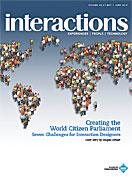Authors:
Stan Mierzwa, Samir Souidi, Irene Friedland, Lauren Katzen, Sarah Littlefield
Several years ago, the Information Technology (IT) group at the Population Council was presented with a situation where researchers had a need and knew that some solutions existed, but what was available did not meet their needs. These investigators asked if there was a technology solution to help obtain more accurate responses to survey questions that concerned subject matter of a delicate nature. In response, the IT group built a software/hardware combination solution that both met the needs of the researchers and was accepted by the people who used the systeman illiterate or semi-literate population that perhaps had never…
You must be a member of SIGCHI, a subscriber to ACM's Digital Library, or an interactions subscriber to read the full text of this article.
GET ACCESS
Join ACM SIGCHIIn addition to all of the professional benefits of being a SIGCHI member, members get full access to interactions online content and receive the print version of the magazine bimonthly.
Subscribe to the ACM Digital Library
Get access to all interactions content online and the entire archive of ACM publications dating back to 1954. (Please check with your institution to see if it already has a subscription.)
Subscribe to interactions
Get full access to interactions online content and receive the print version of the magazine bimonthly.






